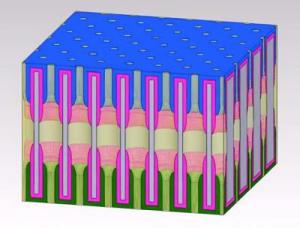Nov 11 2014
Researchers have developed an advanced, all-in-one nanopore battery array that has all the basic components of a regular battery. This innovation could revolutionize miniaturization and integration of energy storage components. The project was a joint effort of chemists and materials scientists from the University of Maryland.
 A billion nanopores could fit on a postage stamp. Credit: NEES, a DOE Energy Frontier Research Center
A billion nanopores could fit on a postage stamp. Credit: NEES, a DOE Energy Frontier Research Center
The nanopore structure is just a small hole in a ceramic sheet, which accommodates electrolytic transfer between nanotube-based electrodes at both ends. In fact, it is possible to integrate millions of nanopores into a stamp-sized battery. This battery can be completely charged all in just 12mins, and can be recharged innumerable times.
The efficiency of this unit is attributed to the fact that each nanopore is designed the same way like other nanopores, making it possible to integrate thin and small batteries efficiently.
Each end of the nanopore is treated so that nanotubes can be added, which in turn collect the electrical charge produced by the liquid electrolyte. In addition, the space within the holes is so compact that the collective space taken up by them would be the size of a grain of sand.
After the successful demonstration of the battery’s working condition, the researchers have identified a novel approach that provides the possibility to make the next version of batteries better and more powerful. They have even developed strategies to enable large-scale production of the nanopore battery.